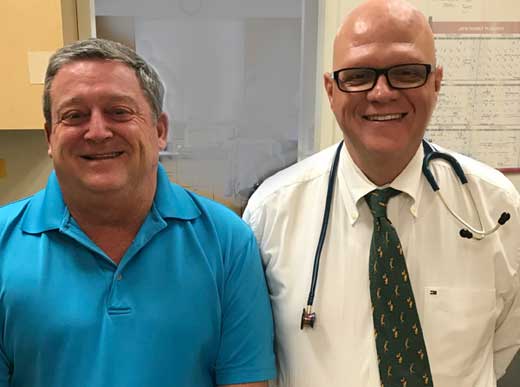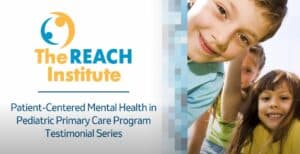
Making Time for Mental Health Care: Advice for Pediatric Primary Care Clinicians
- February 26, 2026
- The REACH Institute
- Child mental health, Coding, Patient communication, Pediatric primary care
Insights from Gene Hershorin, MD, based on a newly released episode of REACHing Solutions, a podcast from The REACH Institute. Time — it’s one of the biggest challenges clinicians face when it comes to addressing patients’ mental health in primary care. With short appointments, lengthy documentation, and countless competing demands, how can clinicians effectively tackle…

Pharmacogenomic Testing in Mental Health Care: Practical Guidance for Pediatric PCPs
- January 29, 2026
- The REACH Institute
- Assessment & screening, Child mental health, High-risk children & youth, Parents, Patient communication, Pediatric primary care
With genetic testing becoming more popular and accessible, many primary care providers wonder whether pharmacogenomic testing (analyzing DNA to understand medication response) is worthwhile when making treatment decisions for patients with mental health conditions. REACH faculty member and clinical psychopharmacologist/psychiatric pharmacist Lynn Crismon, Pharm.D., FCCP, FASCP, DABCP, BCPP, says he is regularly asked about this…

Social Media & Pediatric Mental Health
- December 17, 2025
- The REACH Institute
- Assessment & screening, Child mental health, High-risk children & youth, Parents, Patient communication, Pediatric primary care
Insights from Dr. Jasmine Reese based on an episode of REACHing Solutions, a new podcast series from The REACH Institute Social media is woven into nearly every part of young people’s lives. Recent data shows that about 93% of U.S. teens (ages 13–17) use at least one social media app. For many kids and teens,…

Bullying and Pediatric Mental Health: What Primary Care Providers Should Know
- November 25, 2025
- The REACH Institute
- Assessment & screening, Child mental health, High-risk children & youth, Parents, Patient communication, Pediatric primary care
“Kids seldom come into your office and say, ‘I want to talk about bullying,’” explains REACH faculty member Ron Marino, DO/MPH. “Often, as clinicians, the only indication we have that a child is being bullied are changes in their behavior or new mental health symptoms. It’s our job to notice these changes and take appropriate…

PCPs Are on the Front Lines of Suicide Prevention: Tools to Feel More Confident Having the Hard Conversations
- September 12, 2025
- The REACH Institute
- Assessment & screening, Child mental health, High-risk children & youth, Pediatric primary care, Suicide
“The first time you ask a kid about suicide, it’s scary,” explains Eugene Hershorin, MD, a developmental pediatrician and REACH faculty member. “But navigating that fear and asking the question can save a child’s life.” Research shows that primary care providers have a critical role to play in suicide prevention. Among youth, 80% of those…

Managing Mental Health Disorders in Adolescent Cannabis Users
- August 21, 2025
- The REACH Institute
- Child mental health, High-risk children & youth, Pediatric primary care
“Mental health disorders and substance use are a very common comorbidity, including among youth cannabis users,” shares child and adolescent psychiatrist Blair Ritchie, MD FRCPC. With 40% of youth reporting prior cannabis use, pediatric primary care providers are increasingly likely to see patients in this population who also have mental health needs. Research on the…

Culturally Responsive Parent Empowerment and Children’s Mental Health
- July 23, 2025
- The REACH Institute
- Child mental health, Culturally responsive, High-risk children & youth, Parents, Pediatric primary care
“Parents want to feel like they’re part of the solution for their child’s mental health needs. As pediatric primary care providers, we can help make that possible by being thoughtful in how we navigate cultural differences,” explains Noor Jihan Abdul-Haqq, MD, a REACH faculty member and pediatrician with her own practice in Oklahoma City, OK.…

Mental Health Care for Under- or Uninsured Pediatric Patients
- June 26, 2025
- The REACH Institute
- Child mental health, Coding, High-risk children & youth, Pediatric primary care
“Evaluating and treating mental health problems in under- or uninsured pediatric patients often presents more challenges, but it is even more rewarding when you are able to provide life-changing mental health care,” explains Natalie Robiou, MD, a pediatric primary care provider at a Federally Qualified Health Center (FQHC) in Philadelphia, PA. The number of pediatric…

From Screening Tools to Systems Change: Tips for Putting Your REACH Training Into Practice
- May 22, 2025
- The REACH Institute
- Child mental health, Pediatric primary care
When providers attend their first Patient-Centered Mental Health in Pediatric Primary Care (PPP) training with REACH, many leave feeling empowered and excited to implement their new knowledge. But having evidence-based tools is only the first step in supporting mental health for children and adolescents. We asked several PPP alumni—and one who is now a faculty…

How Clinicians Can Partner with Schools to Support Pediatric Patients
- January 30, 2025
- The REACH Institute
- Child mental health, Parents, Patient communication, Pediatric primary care
“Clinicians who are aware of and know how to direct parents to obtain services for children within the school system can make an enormous difference for patients and families,” explains Dr. Mark Wolraich, MD, a REACH faculty member and retired professor of pediatrics at the University of Oklahoma Health Sciences Center. The challenge for clinicians…

Spotting OCD in Pediatric Patients
- December 19, 2024
- The REACH Institute
- Assessment & screening, Child mental health, Pediatric primary care
“Even among skilled clinicians, misconceptions about obsessive-compulsive disorder or OCD can delay diagnosis and treatment,” explains Carla E. Marin, Ph.D., a licensed psychologist and Assistant Professor at Yale School of Medicine. With common sayings like “we’re all a little OCD” and representations of OCD that center on germs and handwashing, getting a clear picture of…

Why Clinicians Should Consider Coding by Time for Mental Health Care
- November 21, 2024
- The REACH Institute
- Coding, Pediatric primary care
“Many primary care providers are still coding by medical decision-making for mental health care,” explains Eugene Hershorin, MD, a REACH faculty member and medical coding expert. “However, time-based coding is both easier and often results in higher coding levels and therefore higher payment rates, especially for pediatric patients who require ongoing care for mental health…

When parents’ mental health affects children
- January 23, 2024
- The REACH Institute
- Parents, Patient communication, Pediatric primary care
“When we’re thinking about children’s mental health, we’re also thinking about the health of the family unit,” explains Alyx Holden, MD. “In order for children’s neurobiology to develop, they need the support and context of healthy caregivers.”

Sleep Smart: Back-to-School Edition
- August 25, 2023
- The REACH Institute
- Child mental health, Parents, Patient communication, Pediatric primary care
REACH faculty, Dr Kowatch, emphasizes that it’s essential for caregivers to recognize the challenges that can arise when transitioning from summer to a more structured school routine. “Parents have got to anticipate there may be an adjustment period for the first week or two.”

Supporting mental health needs in rural areas
- April 20, 2023
- The REACH Institute
- ADHD, Anxiety, Child mental health, Depression, Eating disorders, High-risk children & youth, LGBTQIA, Parents, Patient communication, Pediatric primary care
Rural healthcare providers can be overwhelmed—and understaffed with specialists. Discover how REACH inspired Elizabeth Wallis, M.D., to build a community to support her patients.

8 Tips for Working with Mental Health Therapists
- October 20, 2021
- The REACH Institute
- Child mental health, Parents, Patient communication Pediatric primary care,
Many patients who have mental health conditions need talk therapy in addition to the treatment you provide as the pediatric primary care provider (PCP). If you practice in an area where therapists are available, we hope you have developed referral relationships, as you learned in your REACH training. You may also see patients who are already working with a therapist.
In either case, the communication between you and the therapist makes a huge difference in the quality of care the two of you provide.
To learn how PCPs and therapists can collaborate to improve the mental health of children and adolescents, we talked with clinical psychologist Kevin Stark, PhD, a founder of The REACH Institute’s CATIE program, and pediatrician Hilary Bowers, MD, director of behavioral and mental health services at Children’s Primary Care Medical Group, a large pediatric practice in San Diego and Riverside counties in California.

Cross-titrating psychiatric medications
- July 26, 2021
- The REACH Institute
- Medication Pediatric primary care,
If you struggle with titrating psychiatric medications for your pediatric patients, you are not alone. Even for some alumni of the REACH program Patient-Centered Mental Health in Pediatric Primary Care, lack of comfort with psychiatric medications can hamper effective treatment.
What does it take to dose and cross-titrate effectively? We asked two REACH faculty members: Peter S. Jensen, MD, REACH founder, and Amy Kryder, MD, education lead of the statewide REACH program in Virginia.

Helping AAPI patients cope with racism
- April 29, 2021
- The REACH Institute
- Anti-racism, Culturally responsive Pediatric primary care,
Discrimination and hate crimes against people of Asian American and Pacific Islander (AAPI) descent have risen during the COVID-19 pandemic. You may be wondering how you can help your AAPI patients cope with feelings that arise from experiences of racism.

Working with challenging families
- October 13, 2020
- The REACH Institute
- Parents, Patient communication Pediatric primary care,
You’re in the consultation room with Anita, who first brought her 15-year-old son Vic to you two weeks ago. Vic has been suspended from school several times for increasingly dangerous behavior. Anita uses a wheelchair because she has multiple sclerosis. Today she is distraught. Last night, she forbade Vic to leave the house, but he went anyway. He didn’t come home last night or go to school this morning. Anita has called everyone she can think of, but no one knows where he is. The police won’t help until he has been missing at least 24 hours. Anita has come to you as a last resort. When you saw Vic, you were troubled by his history of uncontrolled behavior and his uncooperative stance. You were hoping to get him to open up in a follow-up visit. But now Anita is here alone, frantic because she doesn’t know where Vic is. What do you do?

Building family resilience
- July 23, 2020
- The REACH Institute
- Parents, Pediatric primary care Trauma,
“Families provide a kind of protective membrane for children when crazy things are happening around them,” said William Saltzman, PhD. Dr. Saltzman is a faculty member of the REACH program Child/Adolescent Training in Evidence-Based Psychotherapies. “Families really have been on the front line throughout the pandemic,” Dr. Saltzman said. “It’s been a rollercoaster ride from the beginning, with abrupt school shutdowns; the exhaustion of becoming the 24/7 caregiver, teacher, playmate, and breadwinner; and now having to figure out largely on their own how to navigate the upcoming school year.”

Alleviating coronavirus anxiety
- March 14, 2020
- The REACH Institute
- Anxiety Pediatric primary care,
We don’t have to tell you that virtually everyone feels anxious about the spread of COVID-19. An appropriate level of anxiety can be helpful if it inspires people to follow CDC recommendations on hygiene and social distancing. An unnecessary level of anxiety, however, can impair both mental and physical health. Many of your patients and families are suffering from unhealthy anxiety–whether they present with possible COVID-19 symptoms or come in for an unrelated complaint.

New AAP policy on mental health in pediatric care
- November 13, 2019
- The REACH Institute
- Child mental health Pediatric primary care,
The American Academy of Pediatrics (AAP) has released a new policy and an accompanying technical report on mental health competencies for pediatric clinicians. REACH faculty member Cori Green, MD, MS, is a lead author of both documents. We asked Dr. Green, director of behavioral health education and integration at Weill Cornell Medicine in New York City, what the AAP policy and technical report mean for alumni of the REACH program Patient-Centered Mental Health in Pediatric Primary Care. “I hope they’ll be excited to see that what is being endorsed by AAP is essentially what they were taught in their REACH training,” Dr. Green said. In the technical report, the REACH course is described as a promising practice in continuing medical education.

How PCPs can prevent teen suicide
- June 10, 2019
- The REACH Institute
- Child mental health, Depression, Pediatric primary care Suicide,
“It’s not just that we’re more aware of adolescent suicide,” said Michael Scharf, MD, chief of child and adolescent psychiatry at the University of Rochester Medical Center and a REACH faculty member. “The rate really is going up. Teen suicide is still rare, but it’s increasing.” Primary care providers (PCPs) can help teens at risk of suicide, first of all, by being willing to talk about it. “Some people think that asking about suicidal ideation makes the kid more likely to act,” said Dr. Scharf. “But evidence shows that asking either has no impact or has a relieving effect; it frees the patient to talk about the issue.” “You need to think ahead of time of what to ask and how, so you feel comfortable,” said Dr. Scharf. “You need a go-to way to assess risk and how likely the kid is to follow through.” (See Resources below.) The assessment results can range from “nothing to do here” to “send this kid to the emergency department.” “The tricky part,” Dr. Scharf said, “is what to do in between.”

What if the child’s caregiver has mental health issues too?
- May 13, 2019
- The REACH Institute
- Parents Pediatric primary care,
“Mental health flows in both directions, not just downhill from parent to child,” said Peter S. Jensen, MD, founder and board chair of The REACH Institute. The effects on children when caregivers suffer from mental health problems are well documented (see Resources below). Another pattern is that parents and children can share an inherited tendency toward the same disorder. Furthermore, a child’s struggles can trigger disorders such as depression or anxiety in a caregiver. “Blaming parents for their children’s mental health issues is not only a tactical mistake,” said Dr. Jensen, “it’s also simply incorrect.” Pediatric practitioners have to tread carefully when they suspect that the caregiver of a child they are treating has mental health issues.

5 Tips on Coding for Mental Health in Primary Care
- April 12, 2019
- The REACH Institute
- Child mental health, Coding Pediatric primary care,
Some pediatric primary care providers (PCPs) are nervous about providing mental health services because they are not sure they can be paid. However much they may want to treat patients with mental health disorders, they can’t afford to practice for free! Evaluation and management of mental health conditions is time-intensive. PCPs wonder, “How can I spend 90 minutes doing intake?” Those who work in large healthcare systems worry about the WRVUs (work relative value units) by which their productivity is judged. Providers in small practices worry about getting paid for visits that involve primarily talk. “Primary care providers absolutely can be paid for mental health care,” said Dr. Eugene Hershorin, a coding expert in the Pediatric Department in the University of Miami Health System and a REACH Institute faculty member.

How Pediatric Professionals Can Use Cognitive Behavioral Therapy to Address Anxiety
- March 25, 2019
- The REACH Institute
- Child mental health, Cognitive behavioral therapy Pediatric primary care,
“Pediatric primary care providers can have a big impact on child mental health simply because we see children early and often,” said Dana Kornfeld, MD, REACH board member and associate clinical professor of pediatrics at George Washington School of Medicine. Dr. Kornfeld, who practices at Pediatric Care Center in Bethesda, MD, endorses the use of cognitive behavioral therapy (CBT) techniques in primary care to nip potentially crippling anxiety in the bud.

Why Can’t This Kid Sleep?
- January 22, 2019
- The REACH Institute
- Child mental health, Pediatric primary care Sleep disorders,
Alana, age 17, comes in complaining that she is tired all the time and struggles to stay awake during school. Or perhaps it’s six-year-old Miko, whose mother tells you that Miko avoids going to bed and often gets up in the middle of the night. Miko says he doesn’t feel sleepy, but his teachers say he is often inattentive and sometimes quarrelsome. The most common sleep problems among young patients are these and other forms of insomnia or insufficient sleep, according to REACH faculty member Robert Kowatch, MD …

How to Manage School Refusal
- October 29, 2018
- The REACH Institute
- Assessment & screening, Child mental health, Pediatric primary care School refusal,
Ryan, age 12, has missed almost three weeks of school so far. He complains of nausea and headache most school days and has to be cajoled into getting out of bed, but his mother says he is fine on weekends. The mother, who is eight months pregnant, is frantic; she can’t afford to take any more time off work before she delivers. School refusal can have serious consequences. On the short term, the child falls behind academically, both the child and the family experience disruption and distress, and there can be legal and financial ramifications. Long-term consequences for school refusers include violent behavior, school dropout, early marriage, and unemployment. “The main goal of treatment is to get the child back to school as soon as possible,” says Lisa Hunter Romanelli, PhD, REACH Institute CEO and clinical psychologist. “Being absent from school is highly reinforcing.” Like many school refusers, Ryan presents somatic complaints. After you rule out physiological causes– not only for these complaints but also for any underlying conditions that can produce depression or anxiety–what’s next?

“Now people have a place to go”
- May 24, 2018
- The REACH Institute
- Child mental health Pediatric primary care,
In the absence of a single child and adolescent psychiatrist anywhere in Cape May County, New Jersey, The REACH Institute training enabled Rainbow Pediatrics to help families who had nowhere else to turn.
Categories
- ADHD
- Anti-racism
- Anxiety
- Assessment & screening
- Autism
- Child mental health
- Coding
- Cognitive behavioral therapy
- College transition
- Culturally responsive
- Depression
- Eating disorders
- Foster care
- Grief
- High-risk children & youth
- LGBTQIA
- Medication
- Parents
- Patient communication
- Pediatric primary care
- School refusal
- Sleep disorders
- Suicide
- Trauma
- Show All Categories
Register for courses
“The REACH Insitute Video Testimonial: Priya  ”
”
